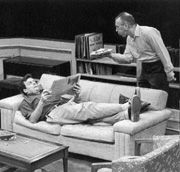THE ODD COUPLE is 35 years old this year. The Tony Award-winning Broadway play inspired a hugely successful film that spawned an even more hugely successful TV series. By the degenerate standards of our day, that makes it a classic, which is the only reason I can think of why ACT has revived it. Because The Odd Couple is a terrible play. You can’t say it hasn’t aged well; it hasn’t aged at all. It’s like the crackers in an old K-ration tin found on a South Pacific beach: They’re just as fresh as they were in 1944, but that doesn’t mean they’re fit to eat now.
The Odd Couple
A Contemporary Theater ends October 29
There’s only one reason to be glad Neil Simon ever wrote the thing in the first place: If he hadn’t, we might never have discovered the phenomenon known as Walter Matthau. Before being cast as the recently divorced sportswriter Oscar Madison, Matthau had appeared in a good 20 movies, nearly always in supporting roles (playing gangsters, mostly).
The closest anyone in Hollywood came to divining the man’s essence as a performer was Stanley Donen, who cast him as the most implausible diplomatic attach頯f all time in his 1963 comedy-thriller Charade. But it was Simon’s slipshod, one-joke excuse for a comedy that let Matthau hone the persona that would carry him successfully through a surprising number of pretty lame vehicles: the sensitive slob, the walking sarcasm with a heart of gold, the lout with a longing for higher things.
Matthau once confided to someone (Simon himself, actually) that inside he felt less like Oscar Madison than like Felix Unger, the fussy, neurotic other half of the Odd Couple team. But that’s exactly why Matthau at his best is so mesmerizing to watch: for the intelligence and humor you feel flickering beneath that coarse, impassive crust. (For Matthau at his most mesmerizing, check out his performance as a renegade CIA agent in the amiable but otherwise unremarkable 1980 spy-comedy Hopscotch.)
ACT’s Oscar, John Procaccino, is an actor of considerable energy, intelligence, and intuition, but he is not all that endowed by nature in the crust department. He has to play the crust, and it’s clearly uncongenial to him. A perceptive friend put a finger on the biggest flaw in Jeff Steitzer’s staging: two born Felixes, no natural Oscar. The Felix cast as Felix, R. Hamilton Wright, suffers just as much as Procaccino from this problem. Without an immovable Oscar to ballast him, how’s a Felix to know how far off the handle to fly?
WRIGHT’S FELIX can seem at times more centered than Oscar, even when supposedly on the edge of hysteria, giving the character a whiff of calculation that is rather nasty to contemplate. If this were intentional, it would be interesting, but clearly the last thing in Steitzer’s mind is exploring beneath the gag-ridden surface of Simon’s piece. His production gives even shorter shrift to the play’s downbeat moments—the loneliness of being single again, the agonies of divorce—than Gene Saks’ laff-a-minute 1968 movie version did.
It’s hard, as well, to know just what to make of the physical production. The costumes, hairstyles (by Marcia D. Jory), and entr’acte music (Stephen LeGrand) might be intended to emphasize the sheer, shattering vulgarity of American popular culture in the mid-1960s. However, they could just as easily be attempts at nostalgia. At Saturday night’s performance, many in the audience chose to take their kitsch straight, to the point of singing along with the vintage Kent cigarette commercial and Shirley Bassey’s rendition of the title song of Goldfinger.
Their reaction shows that, whatever the producers’ intentions, nostalgic trimmings were uncalled for. The Odd Couple isn’t a classic. These days it’s hardly perceived as a play, and more as the pilot episode of an entertainment franchise to be revisited from time to time just to ascertain it’s still there, rather than out of any expectation of being amused by the experience. The material is so familiar from countless syndicated reruns that insight or surprise in the presentation would be off-putting. Comfort food is supposed to be comforting, not stimulating: After all, when you’re feeling like Kraft Macaroni & Cheese, only Kraft Macaroni & Cheese will do.








